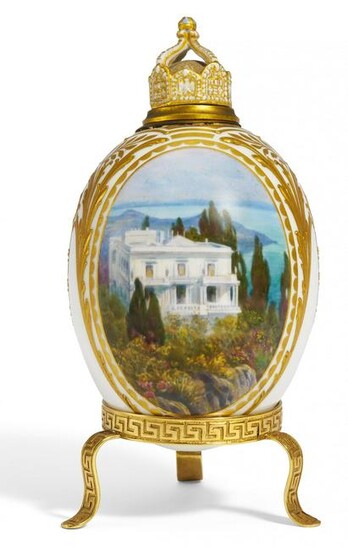Easter egg flacon with depiction of the "Achilleion"
PORCELAIN EASTER EGG FLACON WITH DEPICTION OF THE "ACHILLEION" ON CORFU.
KPM. Berlin.
Date: 19th century.
Technique: Porcelain, enriched in colours and gold.
Description: Ovoid shape with brass mounting and plug in the shape of a royal crown. Oval, gold-framed
reserve on the front with a landscape view of the palace "Achilleion" on Corfu. On the
back, in reserve, monogram of Wilhelm II in gold enamel. All round garland-, leaf and
rocaille decoration in fine gold enamel on white surface.
Measurement: Height including plug 9,5cm.
Mark: Without recognisable marks.
Condition A/B, plug slightly damaged.
Empress Elisabeth of Austria wished for a life "devoted only to quiet contemplation", when she asked her husband to obtain property for her on her favourite greek island Corfu in 1888. She regarded Greece as her "future home". The Emperor, who could not approve his wife's wish to emigrate from Austria entirely, agreed with her on the construction of a summer residence, which he was to finance from his private pocketbook. The German archaeologist Heinrich Schliemann, whose sensational excavations and publications made the study of antiquity in the 1870s and 1880s fashionable, had awakened Elisabeth's enthusiasm for Greece. The empress had her villa and its furnishings built in a spacious park, incorporating antique models. She chose her favourite hero of Greek mythology, Achill, to whom she had a marble monument erected in front of the house, as the name giver for the estate.
Shortly after the Achilleion was completed, Elisabeth expressed: "Our dreams are always more beautiful if we do not make them reality" and urged the Emperor to sell the estate. He refused and it was not until 1907, a few years after the assassination of the Empress in Geneva, that the Achilleion was sold to the Prussian Emperor Wilhelm II. He, who had greatly admired Elizabeth of Austria, turned the palace into a diplomatic centre.
Condition Report: Estimated shipping costs for this lot:
Germany: 15,97 Euro plus 3,03 Euro VAT
EU: 26,89 Euro plus 5,11 Euro VAT
Worldwide: 50,42 Euro plus 9,58 Euro VAT
additional shipping insurance
View it on
Sale price
Estimate
Time, Location
Auction House
PORCELAIN EASTER EGG FLACON WITH DEPICTION OF THE "ACHILLEION" ON CORFU.
KPM. Berlin.
Date: 19th century.
Technique: Porcelain, enriched in colours and gold.
Description: Ovoid shape with brass mounting and plug in the shape of a royal crown. Oval, gold-framed
reserve on the front with a landscape view of the palace "Achilleion" on Corfu. On the
back, in reserve, monogram of Wilhelm II in gold enamel. All round garland-, leaf and
rocaille decoration in fine gold enamel on white surface.
Measurement: Height including plug 9,5cm.
Mark: Without recognisable marks.
Condition A/B, plug slightly damaged.
Empress Elisabeth of Austria wished for a life "devoted only to quiet contemplation", when she asked her husband to obtain property for her on her favourite greek island Corfu in 1888. She regarded Greece as her "future home". The Emperor, who could not approve his wife's wish to emigrate from Austria entirely, agreed with her on the construction of a summer residence, which he was to finance from his private pocketbook. The German archaeologist Heinrich Schliemann, whose sensational excavations and publications made the study of antiquity in the 1870s and 1880s fashionable, had awakened Elisabeth's enthusiasm for Greece. The empress had her villa and its furnishings built in a spacious park, incorporating antique models. She chose her favourite hero of Greek mythology, Achill, to whom she had a marble monument erected in front of the house, as the name giver for the estate.
Shortly after the Achilleion was completed, Elisabeth expressed: "Our dreams are always more beautiful if we do not make them reality" and urged the Emperor to sell the estate. He refused and it was not until 1907, a few years after the assassination of the Empress in Geneva, that the Achilleion was sold to the Prussian Emperor Wilhelm II. He, who had greatly admired Elizabeth of Austria, turned the palace into a diplomatic centre.
Condition Report: Estimated shipping costs for this lot:
Germany: 15,97 Euro plus 3,03 Euro VAT
EU: 26,89 Euro plus 5,11 Euro VAT
Worldwide: 50,42 Euro plus 9,58 Euro VAT
additional shipping insurance



